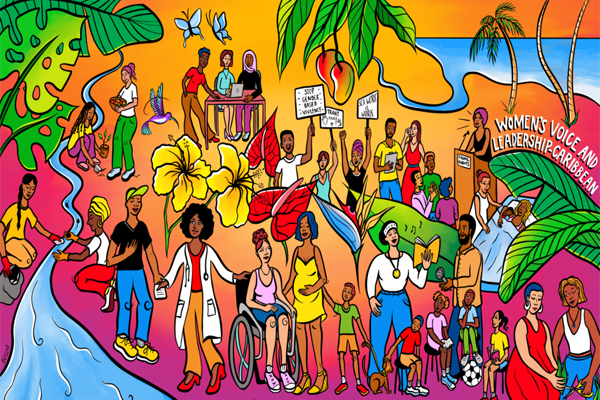
Food insecurity grows in Caribbean
The estimated prevalence of severe food insecurity in the English-speaking Caribbean has increased by 72% since the onset of the pandemic and by 44% as compared to one year ago. Based on estimates extrapolated from a new report by the United Nations World Food Program and Caricom, there has been an increase of one million food-insecure people in the English-speaking Caribbean since the beginning of the pandemic— bringing the estimated number of food-insecure people in the region to 2.8 million (39% of the total population).
More broadly, two years into the pandemic, the economic impact of Covid-19 is combining with food inflation, in part due to the conflict in Ukraine, and significantly impacting food security in the English and Dutch-speaking Caribbean.
“People are buying cheaper foods, purchasing in smaller quantities, drawing on savings and reducing other critical expenditures on health and education to make ends meet,” concludes the report. “On top of these unsustainable measures, they report skipping meals, going to bed hungry and being worried about feeding their families.”
“The Caribbean is at a tipping point for food security. The continued economic impacts of COVID-19 risk widening existing inequalities, and supply chain disruptions will be compounded by the global reverberations of the Ukraine crisis,” the report said. Food systems and food security, the survey found, must be a strategic recovery priority. Among its recommendations, Caribbean governments need to renew their push on food security by, among other things, increasing investments in food systems, regional food production and trade, and developing and expanding initiatives to increase demand for local foods. (Miami Herald)
Most disturbingly, the findings reveal that inequality has been on the rise since the beginning of the pandemic. Severe food insecurity has disproportionately affected lower-income respondents with deepening effects at each round of the survey, writes Daphne Ewing-Chow in Forbes.
Along with the latest survey results, an interactive dashboard allows for comparison between different survey rounds and across several countries. It also provides data on the impact of the pandemic on livelihoods, access to markets and food security by country in the Caribbean. (Relief Web)
———————-
U.S. Supreme Court rejects disability payments for PR residents
The U.S. Supreme Court turned down a bid to allow Puerto Rico residents to claim benefits under the federal government’s main disability insurance program, ruling that the Constitution does not require Congress to offer such payments to residents of the island even though people born there are U.S. citizens. (Politico) The decision will stop more than $2 billion a year from flowing to the island’s residents, reports Bloomberg.
Writing for the court, Justice Brett Kavanaugh said Congress can constitutionally treat Puerto Rico differently than the 50 U.S. states in some circumstances. Justice Sonia Sotomayor, whose family is from Puerto Rico, was the lone dissenter. She wrote that “there is no rational basis for Congress to treat needy citizens living anywhere in the United States so differently from others.”
The legal challenge also prompted debate about whether the denial of Supplemental Security Income benefits to Puerto Rico residents is rooted in racism and whether the court should repudiate a series of century-old cases that permit Congress and local governments to deny some rights to those living in unincorporated U.S. territories such as Puerto Rico.
“Supreme Court ruling begs the question: If our rights are different based on where we live, how tenable are those rights?” writes Xochitl Gonzalez in The Atlantic.
More on Food Security
- IMF is warning of inflation and slowing growth in the Caribbean and Latin America, and recomments countries provide additional social safety nets. Slowing growth and high inflation hit the poor more severely than they hit the wealthy in the region. (Latin America Risk Report)
Climate Justice and Energy
- Over the past two decades, countries in Latin America and the Caribbean lost the equivalent of 1.7% of a year’s GDP due to climate-related disasters and up to 5.8 million people could be pushed into extreme poverty in the region by 2030, according to a World Bank report published this month. (Independent)
- “Caribbean societies witness the effects of global warming and extreme weather events in a disproportionate manner, because of inequalities that are baked into their societies due to the histories of enslavement, colonialism and uneven integration into financial and trading markets,” argues Keston Perry. (SSRN)
- A coalition of climate vulnerable countries — the V20 — is getting to work to develop an international funding mechanism for victims of climate disasters. Finance ministers from the coalition of 48 developing countries,have agreed to design and test a funding facility to address the losses and damages of lives, livelihoods and infrastructure caused by climate impacts. (Climate Change News)
- The Bahamas’ government has failed to resolve the significant backlog of applications for approval for environmental projects, criticized environmentalist Joe Darville. Waterkeepers Bahamas has collected close to 3,000 mangrove propagules for replanting, but has not been able to get permits to advance in their work restoring mangroves. (Eyewitness News)
- “May 2022 will make seven years since Guyana is without an updated legislative and regulatory framework that is essential for the protection of the oil industry against mismanagement and corruption,” writes Kiana Wilburg in Kaieteur News. “One of the key regulatory pieces that remain in limbo, is the Petroleum Commission Bill that would pave the way for the appointment of an independent regulator.”
- Guyanese Indigenous leaders are calling on the country’s government to ensure that they are involved in draft Low Carbon Development Strategy discussions. The community is adamant that the government must also assist through budget allocations to ensure that work continues in protecting the general rights of Amerindians. (Kaieteur News)
Decolonization and Racial Justice
- Far-right French presidential candidate Marine Le Pen lost to incumbent Emanuel Macron this weekend, but finished far ahead in some of France’s overseas territories. Analysts say the polls demonstrate protest against Macron, but also a sustained drive for votes by the far-right party in the overseas territories, where social deprivation is significantly higher than on the mainland, reports the Guardian.
- Antigua and Barbuda should “one day become a republic”, Prime Minister Gaston Browne told visiting British royals Prince Edward and his wife during their Caribbean tour. While the shift is not currently on the table, it marks that Antigua and Barbuda is the latest member of the Caribbean Commonwealth aiming to remove the Queen as head of state. (St. Lucia Times)
- The latest royal visit to the region was met with demands for slavery reparations in St. Vincent and the Grenadines, mirroring protests encountered by Prince William and his wife on a recent tour of other Caribbean countries. Browne urged the Earl and Countess of Wessex hto use their “diplomatic influence” to achieve “reparatory justice” for the island of Antigua and Barbuda. (PA Media)
- The Caribbean is entitled to a development plan and support from Britain, says Sir Hilary Beckles, University of the West Indies (UWI) Vice-Chancellor. “Britain systematically suppressed and subverted every significant indigenous effort for social justice, economic access and, later, economic development,” he said at the launch of his new book, ‘How Britain Underdeveloped the Caribbean: A Reparation Response to Europe’s Legacy of Plunder and Poverty’ (Ron Fanfair)
Economics, Debt and Finance
- The Global Minimum Tax is another vulnerability vector, as well as a door for discrimination against small states, argues Marla Durkharan in IFC Review.
- Venezuela has agreed to cancel St. Vincent and the Grenadines’ debt under PetroCaribe, its oil initiative with Latin American and Caribbean nations. This could see the national debt fall by 9%, according to Prime Minister Ralph Gonsalves. (iWitness News)
Regional Relations and Diplomacy
- Cuban officials accused the U.S. of excluding the island’s government from the upcoming Summit of the Americas, which will be held in Los Angeles in June. Cuban foreign affairs minister Bruno Rodríguez said the U.S. Biden administration is also putting pressure on countries in the hemisphere who oppose excluding Cuba from the largest regional gathering of hemispheric leaders, reports the Miami Herald.
- U.S. Special Advisor for the Summit of the Americas Christopher Dodd traveled to Bridgetown, Barbados last week to meet with Caricom leaders to discuss regional priorities in advance of the Ninth Summit of the Americas in June. (U.S. State Department)
Migration
- The U.S. Coast Guard stopped a total of 84 people from Cuba migrating by sea off the Bahamas and the Florida Keys last week. South Florida is in the midst of a surge in maritime migration from both Cuba and Haiti, notes the Miami Herald.
Public Security
- Armed clashes between warring violent gangs are spurring growing violence in Haiti, reports the Miami Herald. “Haiti is blocked,” said Pierre Espérance, of the National Human Rights Defense Network. “We are in a situation where the only thing you can think about is your security. Not schooling, not anything else. There is no living here. The insecurity situation has paralyzed the country. … If you don’t have a need to go out in Haiti, you don’t go out.”
Culture
- Dahlma Llanos-Figueroa’s groundbreaking novel, A Woman of Endurance, illuminates a little discussed aspect of history—the Puerto Rican Atlantic Slave Trade—witnessed through the experiences of Pola, an African captive used as a breeder to bear more slaves. (Repeating Islands)
Opportunities
- 31 May — Open Call Mentorship for Cultural and Artistic responses to Environmental Change — Prince Claus Fund & Goethe-Institut
- 14 June — Pérez Art Museum Miami’s Caribbean Cultural Institute (CCI) Fellowship program — Repeating Islands












